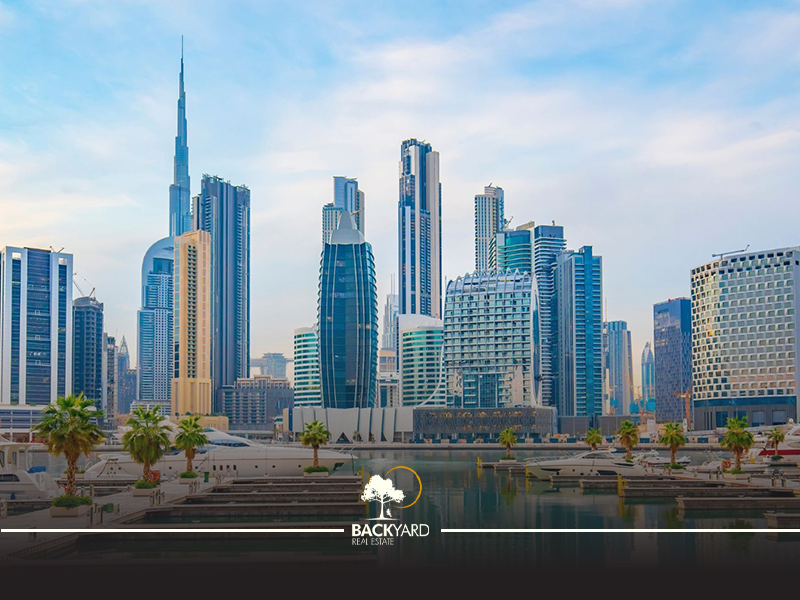 Buy Property in Dubai: Ownership Types & Fees Explained
Buy Property in Dubai: Ownership Types & Fees Explained
Are you dreaming of buying a home in Dubai? Guess what you are not alone. For many buyers, Dubai offers a rare mix of lifestyle and high returns that’s hard to find elsewhere. With its luxurious lifestyle, world-class infrastructure, tax-free environment, and diverse property options, it’s no surprise that more and more expatriates are investing in the city. Whether you’re searching for Dubai apartments for sale overlooking the Marina or exclusive houses for sale in Dubai in family-friendly neighborhoods, understanding the process is essential before making a purchase.
The good news? The process to buy property in Dubai is far less complicated than most people think. With the right guidance, you can go from browsing listings of Dubai apartments for sale to holding the keys to your new home faster than you expect.
Explore Backyard’s simple guide, and the key steps to buy property in Dubai, highlight the differences between freehold and leasehold ownership, explain legal frameworks, and share expert tips to make your investment journey smooth and rewarding that will walk you through the process, the costs, and everything else you need to know before making one of the best investments of your life.
1. Understand Ownership Process to Buy Property in Dubai
Before you jump into the process of buying property in Dubai, it’s important to know how ownership works here. The property market in Dubai is built on two distinct ownership rights: freehold, which gives buyers full control, and leasehold, which is limited to a fixed term
- Freehold Ownership
If you’re an expat, you can own property in Dubai within specific freehold communities. These are areas the government has opened up to foreign investors, where you get complete ownership of the property as well as the land it sits on. Popular examples include Dubai Marina, Palm Jumeirah, and Downtown Dubai-each offering a very different lifestyle.
- Leasehold Ownership
This type of buying property in Dubai is considered as a long-term rental, you’re leasing the property for a fixed term (usually 30–99 years). Ownership of the land remains with the freeholder, typically the government or master developer. When the lease ends, ownership goes back unless it’s renewed.
For most expats, freehold zones are the top choice since they provide long-term security and flexibility. Fortunately, Dubai has more than 70 of them.
2. Pick the Perfect Neighborhood
From budget-friendly studios to palatial villas. Whether you’re seeking for Dubai apartments for sale or grand houses for sale in Dubai, there’s something for every lifestyle.
Here are some the most popular hotspots for expats:
- Palm Jumeirah: Beachside luxury villas and apartments
- Dubai Marina: Lively waterfront high-rises
- Downtown Dubai: City living near Burj Khalifa
- Dubai Hills Estate & Arabian Ranches: Perfect for families with schools and parks
- Dubai Creek Harbour: Modern living with skyline views
3. The Process of Buying Property in Dubai:
Here’s how the process usually works for expats:
- Find the suitable property
- Sign the sales agreement
- Pay the deposit
- Get the developer’s NOC (No Objection Certificate)
- Transfer ownership at the Dubai Land Department
Whether you’re in Dubai or halfway across the world, the buying process is set up to be seamless and fully remote. Thanks to digital signing and power of attorney, you can buy your dream place from anywhere in the world.
4. Additional Costs to Consider
Buying property in Dubai is tax-free, yet buyers must know number of mandatory fees before completing a purchase.:
- Dubai Land Department fee
- Registration/admin fees
- Annual service charges

5. Financing Options for Expats
Expats are eligible for competitive mortgage rates to buy property in Dubai. Many banks offer loans covering up to 75–80% of the property value. In fact, in some cases, mortgage repayments are lower than rental costs for a similar property, making ownership an attractive and reasonable option.
6. Residency and Remote Buying
Property ownership can even help you qualify for a long-term UAE residence visa depending on the value of your investment.
Additionally, thanks to Dubai’s digital property transfer system, buyers can complete the entire process remotely.
7. Backyard Advice for First-Time Buyers:
We recommend the following:
- Research the Location: Each Dubai community offers different lifestyles, amenities, and investment potential.
- Hire a Reputable Broker: Work with experienced agencies to avoid legal issues and secure the best deals.
- Check the MOU Carefully: Since it controls the transaction, make sure all terms are clear.
- Plan Long-Term: Whether buying for personal use or investment, consider potential rental yields and resale value.
8. Why Buying Property in Dubai?
- Tax-Free Advantage
- Attractive Rental Yields
- Safe, Transparent Market
- Wide Range of Choices
FAQs About Buying Property in Dubai
- Can foreigners buy property in Dubai?
Yes, expats can buy property in designated freehold zones with full ownership rights.
- Do I need to live in Dubai to own property?
No, you can buy property as a non-resident and even complete the process remotely.
- What is the minimum investment required to get a residency visa?
Currently, property investments worth AED 750,000 or more may qualify you for residency, but this depends on the visa type.
- Are there hidden costs when buying property?
Aside from the purchase price, budget for 4% DLD transfer fee, 2% agent commission, and annual service charges.
- Which Should You Buy in Dubai?
It depends on your lifestyle and budget. Apartments in Dubai Marina or Downtown are great for rental income, while houses in Arabian Ranches or Dubai Hills suit families.
Final Thoughts
For expats, buying property in Dubai is easier than ever, with clear regulations, competitive finance process, and diverse property options. Whether you’re searching for modern Dubai apartments for sale or spacious houses for sale in Dubai, the city offers strong returns and long-term security.
Source: The National News




